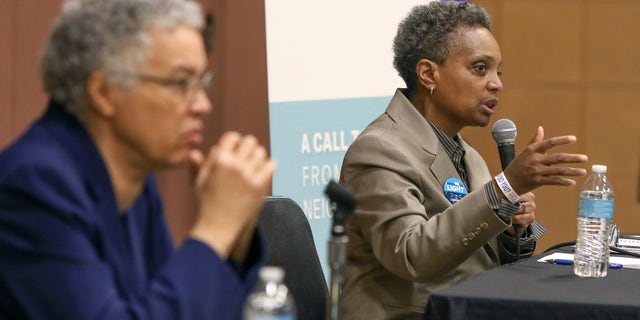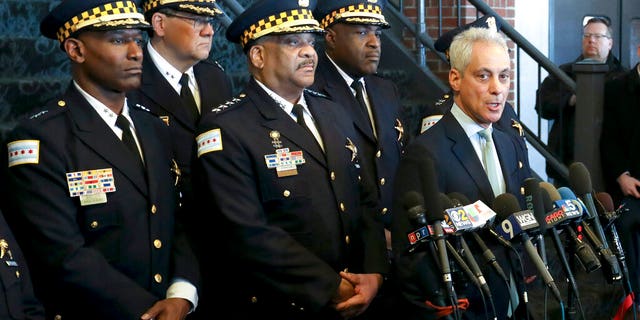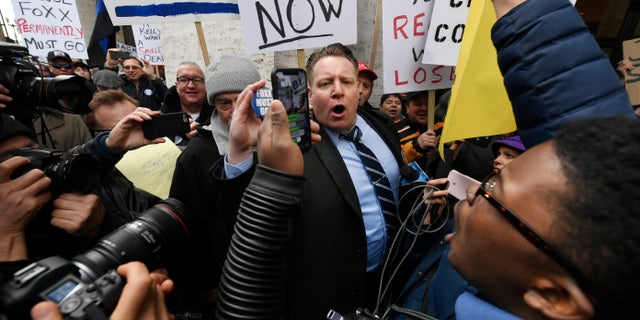Senate Majority Leader Mitch McConnell deployed
the so-called 'nuclear option' Wednesday by changing the
Republican-controlled chamber’s rules to speed approval of President
Donald Trump’s nominees who have been slow-walked by Democrats.
'It is time for this sorry chapter to end,' said the Kentucky Republican, who noted the new rules will apply to future nominees by the president. 'It’s time to return this body to a more normal and reasonable process for fulfilling its constitutional responsibilities, no matter which party controls the White House.'
Under the new rule approved 51-48, debate time on the Senate floor
for lower-level administration nominees will be cut to two hours from 30
hours. The Senate plans to vote later Wednesday to adopt the same rule
for U.S. district court judges.
McConnell said the move is needed to allow Trump to staff his government. It will help McConnell fill scores of open judgeships -- a top priority -- without having to use months of the Senate calendar.
The GOP is leaving unchanged the requirement of 30 hours’ debate for Cabinet-level appointments, other senior appointments and higher court nominees.
Democrats called the rule change another power grab by McConnell, who
used obstruction tactics numerous times himself when Barack Obama was
president. McConnell refused to hold a hearing for Supreme Court nominee
Merrick Garland and blocked numerous other lower court nominees in the
final two years of Obama’s presidency. The Supreme Court seat ultimately
went to Trump appointee Neil Gorsuch.
Democrats suggested there isn’t a real problem in confirming presidential nominees. They point to statements by McConnell and Trump bragging about setting records for court confirmations, and to Trump appointees who have either left under ethical clouds or been blocked on the Senate floor.
'It’s going to make it easier to rush unqualified and extreme Trump
nominees to the Senate before anybody notices,' said Democratic Senator
Ron Wyden of Oregon.
McConnell’s blockade of key Obama nominations prompted then-Democratic Leader Harry Reid to deploy the nuclear option to eliminate the 60-vote threshold to advance most nominations. At the time, McConnell was livid. Now, he’s echoing Reid’s arguments about the need to prevent a minority from obstructing a president, and using the same tool Reid used to overturn Senate precedent.
McConnell also used the procedure -- which effectively breaks the
Senate rules to change the rules -- in 2017 to eliminate the 60-vote
threshold for Supreme Court nominations.
Still, a number of Republicans insist on keeping the legislative filibuster, which allows the minority party to demand a 60-vote threshold to advance a bill. McConnell himself made clear Wednesday he still opposes getting rid of the legislative filibuster.
'The legislative filibuster is central to the nature of the Senate,' McConnell said. 'It always has been and must always be the distinctive quality of this institution.'
'It is time for this sorry chapter to end,' said the Kentucky Republican, who noted the new rules will apply to future nominees by the president. 'It’s time to return this body to a more normal and reasonable process for fulfilling its constitutional responsibilities, no matter which party controls the White House.'
McConnell said the move is needed to allow Trump to staff his government. It will help McConnell fill scores of open judgeships -- a top priority -- without having to use months of the Senate calendar.
The GOP is leaving unchanged the requirement of 30 hours’ debate for Cabinet-level appointments, other senior appointments and higher court nominees.
Democrats suggested there isn’t a real problem in confirming presidential nominees. They point to statements by McConnell and Trump bragging about setting records for court confirmations, and to Trump appointees who have either left under ethical clouds or been blocked on the Senate floor.
McConnell’s blockade of key Obama nominations prompted then-Democratic Leader Harry Reid to deploy the nuclear option to eliminate the 60-vote threshold to advance most nominations. At the time, McConnell was livid. Now, he’s echoing Reid’s arguments about the need to prevent a minority from obstructing a president, and using the same tool Reid used to overturn Senate precedent.
Still, a number of Republicans insist on keeping the legislative filibuster, which allows the minority party to demand a 60-vote threshold to advance a bill. McConnell himself made clear Wednesday he still opposes getting rid of the legislative filibuster.
'The legislative filibuster is central to the nature of the Senate,' McConnell said. 'It always has been and must always be the distinctive quality of this institution.'





















